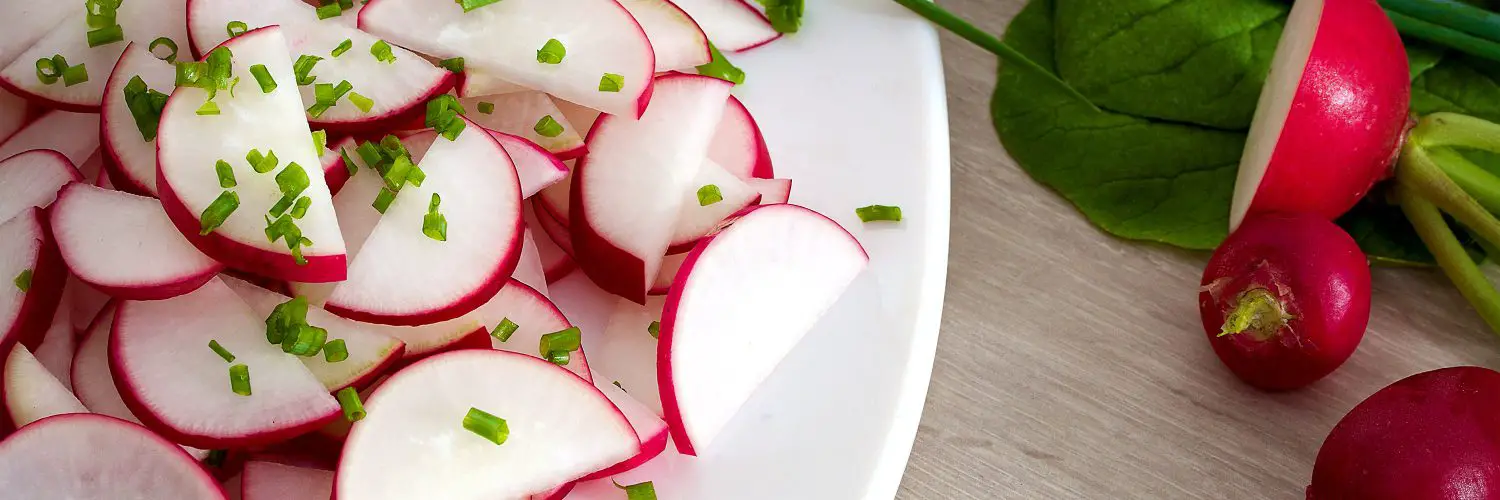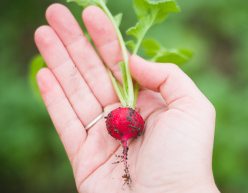Ancient Chinese healers referred to radishes as “warming” foods and related them to the area of the lungs, spleen and stomach. They believed the root vegetable stimulated the flow of vital Qi energy, so it was added to many herbal medicines, either fresh or dried. It was also used in form of juice. The radish was said to detoxify the body from excess mucus, so it was used to treat respiratory ailments. Also it was used to treat almost all gastrointestinal problems.
Modern Oriental folk healers give the root vegetable rejuvenating properties because of its ability to “warm up” the body and improve digestion.

The radish is a low-calorie food and it contains considerable amount of minerals and vitamins. This root vegetable is characterized by substantial content of phenolic compounds, which have antioxidant properties. They help to reduce oxidative stress, increase the body’s resistance to the development of cancer, improve the cardiovascular and digestive systems. Also, radishes might be useful for type 2 diabetes.
When it comes to methods of consumption, it is best to be eaten fresh, which is not surprising as it’s mostly true for all kinds of evetables. During canning, radish loses some vitamins and often gets an excessive amount of salt, which is less than ideal for your health concerns.
Are radishes healthy to eat?
The interesting thing about this question is that scientists have already answered it! Here’s what they determined…
After a long and detailed study of the radish’s composition, scientists have come to the conclusion that one of its main health benefits is the content of various phenolic compounds. Their main value is that they provide antioxidant protection to the body. However, their effect is not limited to this. For example, they enhance the effect of vitamin C, reduce capillary fragility, support normal functioning of the cardiovascular and digestive systems.
Researchers believe that anthocyanins, the plant pigments that give radishes their reddish color, have a distinct anti-inflammatory effect that can delay or prevent the development of chronic disease in its early stages. Because of their antioxidant properties, they can also protect the body from the development of certain types of cancer (colon, stomach, kidney). The phytochemicals indoles (especially indole-3-carbinol) also contribute to the prevention of cancer.
In addition, radishes contain polyunsaturated fatty acids (omega-3 and omega-6), which are not synthesized by our bodies and come only from food. Although radish only have them in small concentrations. Many people these days actually are deficient in these acids, so any source of them is an important part of healthy diet. They are involved in many processes and have a positive effect on the nervous system. Moreover they help to reduce cholesterol levels, thinning the blood and thus prevent blood clots. They are also associated with improved liver function.
Dietary fibers found in radishes (In contrast to the soft, juicy fiber found in most vegetables like cucumbers or tomato which are easily broken down by your digestive system) act as roughage – they help prevent constipation by adding bulkiness (which can make waste products easier to pass) without any nutritional value themselves.
They improve intestinal peristalsis and thus help the digested food to move more quickly and easily to the rectum. Fiber eliminates constipation and cleanses the GI tract by absorbing toxic elements.
By the way, in one study on rats, Korean scientists noticed that not only the root vegetable itself, but also the leaves of the plant help normalize the stomach and intestines.
In addition, the radish stimulates the production of bile, which is also necessary for the digestive process. With the help of dietary fiber, radishes are able to move nutrients through your body and extract important fluids.
Dietetics and Clinical Nutrition specialists say, that while radishes may not be the most glamorous vegetable, but they’re a high water and low glycemic index food that can help manage diabetes. They contain fiber which helps with blood sugar levels – so if you need some more healthy carbs in your life Radish incorporation is worth considering! Fresh radishes are often recommended for diabetes. It stabilizes and keeps sugar levels normal for a long time. Dentists also recommend eating this crunchy vegetable because, firstly, it strengthens the teeth, and secondly, it stimulates the abundant production of saliva, which flushes the oral cavity and especially the inter-dental space.
In terms of minerals, radish is most rich in potassium, which has a beneficial effect on the cardiovascular system, helping to reduce high blood pressure. Zinc and phosphorus combined with vitamin C help improve skin health. And calcium together with folic acid are especially useful for women during pregnancy, as they ensure the correct formation of the child’s nervous and musculoskeletal systems.
Finally, radish is considered an effective natural diuretic. Due to this property, it is able to cleanse the kidneys from toxic elements. With inflammation of the urogenital system, the juice of the root vegetable can reduce the painful symptoms that occur during urination.
Scientists are researching the potential of radishes as a drug manufacturing ingredient. To date, this root vegetable has not been used in drugs but scientists believe that the root vegetable has potential with an emphasis on cancer research.
The World Health Organization and the International Agency for Research on Cancer have long been conducting a large-scale study in which they observe patients at high risk of developing cancer who consume certain vegetables. The experts then evaluate how much of an effect the product has on keeping the disease in check.
It turns out that the bioactive substances contained in radishes show promising results against colorectal cancer. Scientists hope to create a series of drugs based on them, which, compared to synthetic agents, will have fewer side effects.
Sulforaphane and indole-3-carbinol supplements (chemicals more commonly extracted from broccoli and less frequently from radishes) can also be found in pharmacies. They are attributed a lot of useful effects: from painless weight loss to cancer treatment, but you should be careful and always consult a doctor before using any drug.
























Add comment